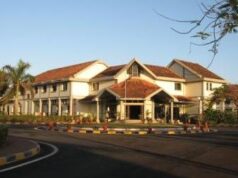India successfully hosted the Annual General Meeting (AGM) 2025 of the Asian Forum for Polar Sciences (AFoPS) from 19 to 20 September 2025 in Goa. The meeting was organised by the National Centre for Polar and Ocean Research (NCPOR) under the Ministry of Earth Sciences, Government of India.
Established in 2004, AFoPS is an inter-institutional, non-governmental forum promoting cooperation in polar research among Asian countries. It brings together leading polar research institutions from China, Japan, South Korea, India, Malaysia, and Thailand, developing collaborative research in glaciology, oceanography, earth and planetary sciences, and life sciences, while coordinating logistics, data sharing, and capacity building. Its key decision-making body, the AGM, reviews Working Group and Action Group activities, approves research proposals, and strengthens Asia’s contribution to global polar science and climate research.
The AGM brought together delegates from AFoPS Member Countries along with a special opening address by Prof. Gary Wilson, President, Scientific Committee on Antarctic Research (SCAR), who shared insights on SCAR programs and invited AFoPS experts to contribute to the Horizon Scan on science priorities under climate change.
Over two days, the forum reviewed progress on collaborative research projects, working group activities, and logistics cooperation in polar regions. Delegates deliberated on new proposals across earth sciences, ocean sciences, glaciology, planetary science, and life sciences, aiming to strengthen Asia’s collective contribution to global polar research.
This was the second AFoPS meeting hosted by India, following the 2012 AGM in New Delhi. India currently chairs AFoPS, with Dr. Thamban Meloth, Director, NCPOR, serving as Chair until 2026.
Highlighting the significance of collaboration, he said, “Asian countries now form the largest block contributing to polar infrastructure, including research stations and ice-class vessels. AFoPS aims to leverage this advantage to undertake cutting-edge collaborative projects in Antarctica and the Arctic as a contribution to the 5th International Polar Year.”
Dr. Meloth further emphasised India’s leadership role, noting: “India’s hosting of the AGM underlines our commitment to fostering Asian cooperation in understanding the polar regions, which are critical to global climate and ocean systems.”
Session I: National Reports provided a comprehensive overview of national polar programmes. Presentations included China’s CHINARE Programme (Wang Jinhui), detailing scientific expeditions, station operations, and Antarctic research achievements; India’s polar programmes (Rahul Mohan), covering Antarctic and Arctic initiatives, logistics, station management, and Southern Ocean research; Japan’s NIPR activities (Yoshifumi Nogi), highlighting Antarctic research, infrastructure, and long-term observations; KOPRI updates (Jihoon Jeong), covering Arctic and Antarctic research highlights, fellowship programs, and international collaborations; and updates from Malaysia and Thailand, detailing expedition planning, operational logistics, and ongoing scientific studies. Collectively, these reports offered a holistic view of Asia’s current polar research capabilities, scientific priorities, and operational challenges.
Session II: IPY5 – AFoPS Roadmap for Collaborative Endeavours focused on enhancing multilateral cooperation and shaping future research directions. China, through Lei Ruibo, outlined potential contributions to the 5th International Polar Year (IPY5), emphasizing new research concepts and collaborative opportunities. Presentations on Antarctic fall-winter ecosystems by Meng Zhou explored regional biodiversity and avenues for multi-country research. Collaborative projects, particularly the India–Japan joint initiatives, were presented by Yusuke Suganuma and Yoshifumi Nogi, highlighting field studies, data sharing, and long-term objectives. Korean researchers, including Jinyoung Jung and Khang Hyun Lee, detailed Arctic and Antarctic research highlights, inland expeditions, and strengthened international collaborations.
A major focus of the AGM was polar infrastructure, logistics, and operational collaboration. China’s Jie Li presented updates on station management and logistical support. India’s delegates, Shailendra Saini, Manish Tiwari, and Sabu P provided comprehensive updates on India’s Antarctic and Arctic programmes, Southern Ocean research, and expedition planning.
Japan’s Satoshi Imura highlighted national polar infrastructure and logistics, while Malaysia’s delegates, Wan Mohd Rauhan Wan Hussin and Tamalia Amanda Putri Othman, outlined expedition strategies and operational plans. These presentations underscored the importance of coordinated logistics and infrastructure development for effective polar research in Asia.
The AGM concluded with the AFoPS Business Meeting, held in a closed-door format, during which strategic planning, approval of new projects, coordination of Working and Action Group activities, and future collaboration frameworks were discussed. The deliberations reinforced AFoPS’s role as a key platform for Asia-centric polar research, enabling member countries to pool resources, share expertise, and strengthen their collective scientific impact globally.
Overall, the AFoPS AGM 2025 provided a robust forum for knowledge exchange, strategic planning, and operational coordination, underscoring the importance of scientific collaboration, capacity building, and logistical synergy in advancing polar research across Asia.
The meeting reaffirmed member nations’ commitment to contributing to global polar science, climate studies, and sustainable management of polar ecosystems through coordinated, multinational initiatives.




